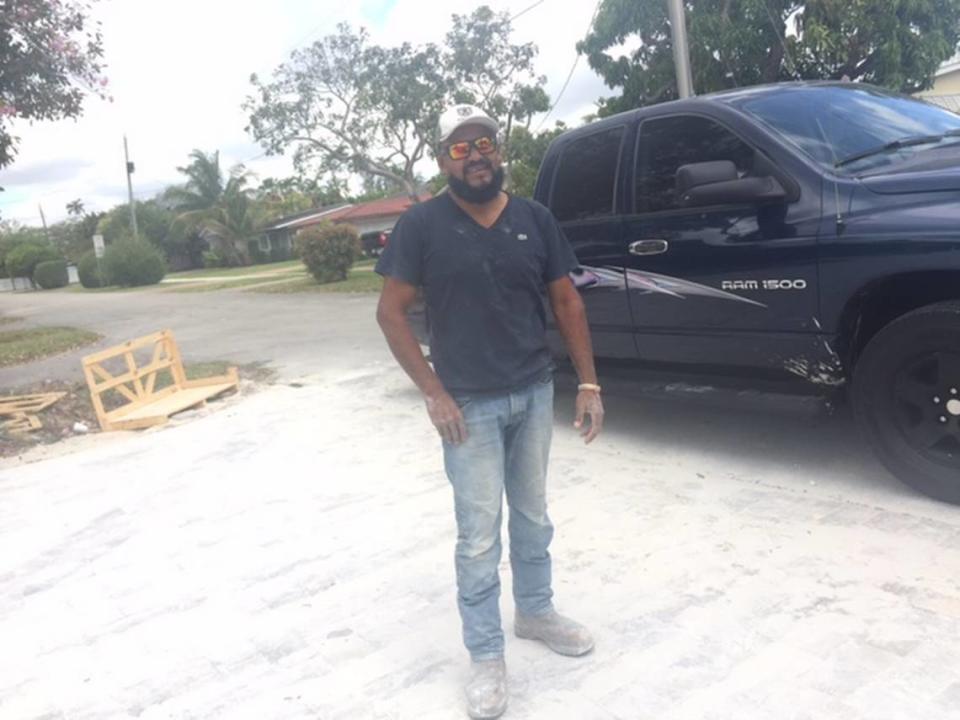These workers do not stop — even for the coronavirus
Note: The Miami Herald and McClatchy news sites have lifted the paywall on our websites for this developing story, providing critical information to readers. To support vital reporting such as this, please consider a digital subscription.
Even as many restaurants, shops and enclosed spaces in South Florida see fewer and fewer people going out to block the spread of coronavirus — making the hashtag #imstayinginside popular on social networks — Miami is still far from being a ghost town.
Hourly employees and small business owners — without the benefit of paid vacations — are continuing to cut lawns, lay bricks and clean hotels, offices and homes.
In many South Florida neighborhoods, the clamor of lawnmowers and construction equipment still reverberates through the streets. Behind the noisy tools are gardeners and bricklayers, handymen and contractors, dressed in long sleeves and hats to protect themselves from the Florida sun, which can lead to skin cancer. When they wear a mask, they say they do it more because of the dust than because of the fear of the coronavirus. Working outside protects them, they believe.
“Construction doesn’t stop,” said Orlando Molina, owner of Molina Paver, who along with four other workers was putting the finishing touches on the driveway of a house in northwest Miami.
“We’ll finish here tomorrow and then we go to another house in Key Biscayne,” Molina said, taking a halt from pushing the machine that tamps the dust between the slot in the bricks.

The owner of the company said he wanted to continue working as long as possible. “In the future, this is going to damage the economy a lot because everything stops. As long as there is work, you have to continue.”
“You just have to take a risk,” he said. To mitigate it, his workers now wash their hands frequently and take precautions at lunchtime.
Juan Carlos Martínez, owner of J&I Electric Service Corp. in Hialeah, said he has no plans to stop work because of the outbreak. Nor does he believe that he will have to fire any of his four employees.
“We are not going to stop because we do not have much contact with the public,” he said as he lowered tools from his truck in front of a house in Miami Springs. “We only do construction and remodeling on empty houses.”
“We are inside the houses by ourselves and the most annoying thing is the dust,” he said. Though he recognizes his business could be hurt by a recession, he said he hasn’t felt an impact yet.
And its not just outdoors-oriented jobs that are still underway. Elsa Romero, 55, who works the late shift as a cleaner at a downtown skyscraper, scrubbing surfaces include office desks, floors and restrooms. Romero suffers from diabetes, and spends most of her $9-an-hour wages on medications, she said.
It’s a precarious living — but the good news, for now, she says, is that everything is normal. “I’m still coming into work,” she said through a translator. “Nothing has changed.”
Economic risk
For many workers, concern about the economy is now top of mind — especially as New York City considers a “shelter in place” order similar to that in San Francisco, where residents are allowed to leave home only for essential tasks, like grocery shopping and doctor visits.
How deep the economic damage might be, and how long it might last, depend largely on the progression of the outbreak, according to Frederick V. Perry, a business law professor at the Florida International University School of Accounting. The speed of transmission and the numbers affected will be key, along with the time needed to find a treatment or a vaccine, and actions by government designed to mitigate the damage.
On Tuesday, President Donald Trump said that the government would present a stimulus package of at least $850 billion to curb the economic free-fall. Proposals call for relaxing mortgage payment schedules and direct payouts to citizens.
In Perry’s view, strict measures taken now to prevent contagion will lessen the long-term damage to the economy. But already, consumer spending seems to be slowing dramatically as stores and restaurants close and stock market volatility continues.
“As the virus is contained, the economy will recover,” Perry said. But complications including the trade war with China and challenges in Latin American economies may slow progress.
“The World Bank has said it estimates world growth to be 1.5%. That is not enough to feed people, because the population growth is higher,“ said Perry.
How tourism is affected
With travel restrictions and cutbacks in flights, cities and countries dependent on tourism are already feeling the punch. In the United States, about 10% of employees work in the tourism sector, Perry said. Tourism accounts for about 150,000 jobs in Miami and about 99,000 jobs in Broward.
One big factor: the absence of Chinese tourists. Though relatively few visit South Florida, their overall impact is significant. In 2018, Chinese tourists spent $277 billion worldwide.
For Miami, which is heavily dependent on visitors from Europe and Latin America, the pain is already apparent.
“Hotel occupancy is going to be reduced by 50%,” Francisco Arocha, CEO and founder of HES Group, a hotel management company in Miami, told El Nuevo Herald he expected overall occupancy to drop 50% this year at his hotels.
Even so, the executive is confident in the recovery of the hotel sector in Miami, which had an excellent start to the year with the Super Bowl, and is used to showing its ability to adapt to phenomena such as hurricanes.
“Our hotels are for business travelers,” Arocha said. “Hopefully they recover faster than those who are focused on tourism.“

